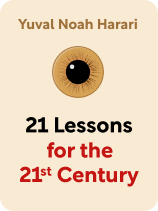

This article is an excerpt from the Shortform book guide to "21 Lessons for the 21st Century" by Yuval Noah Harari. Shortform has the world's best summaries and analyses of books you should be reading.
Like this article? Sign up for a free trial here .
What is the future of terrorism? Will there be more or fewer terrorist attacks going forward?
According to Yuval Noah Harari, the author of 21 Lessons for the 21st Century, we shouldn’t worry too much about the future of terrorism because the threat is currently minor. However, if terrorists obtain nuclear weapons or launch cyber- or bioterrorism attacks, the threat can grow exponentially.
Keep reading for more about the future of terrorism.
Yuval Noah Harari on the Future of Terrorism
In recent decades, fear of terrorism has gripped the world, ignited wars, and shaped politics—and that’s by design. With the exception of outliers like 9/11, most acts of terrorism kill very few people; far more people die in traffic accidents or from diabetes. As the name suggests, terrorism is meant primarily to incite terror, but it generally causes little physical damage.
In an attack, most military strategists aim to destroy the enemy’s most powerful weapons and essential resources, in order to handicap any retaliation. However, terrorists don’t have the power to inflict such damage, so their attacks often do little to harm their enemies’ weapons, equipment, and infrastructure. Terrorists instigate their enemies to cause damage that the terrorists don’t have the strength to create.
Terrorism Aims to Undermine Safety and Stability
Terrorism is only effective because most centralized countries are unaccustomed to political violence. Before modern times, political violence was a fact of life as groups gained power only through violent force. As the centuries passed, many governments were able to reduce and nearly eradicate political violence. This shift had two effects that made terrorism a viable strategy:
- The public began to perceive even small attacks as major threats. Consequently, terrorists could make a small impact with few casualties and still create the intended fear and chaos.
- The government’s legitimacy became dependent upon its ability to prevent political violence in the public sphere. As a result, even minor terrorist attacks do greater damage by undermining the government’s legitimacy.
In order to effectively fight terrorism, nations must respond on three fronts:
- Government: Officials must resist the temptation to make a public show of their response to terrorism. Instead, they should take clandestine actions to hurt terrorists’ networks.
- Media: Terrorism is all about creating a spectacle to incite fear, and publicity is crucial. The media must resist playing into this by overblowing the threat of terrorism. Instead, the media should keep the actual threat of terrorism in perspective with other dangers.
- Public: Terrorism only works if it provokes fear and confusion. Instead of feeling terrorized, average citizens can fight terrorism by understanding terrorists’ tactics and not inflating the threat of danger.
Although terrorists are only a minor threat now, they could become exponentially more dangerous if they obtain nuclear weapons, or if they launch cyberterrorism or bioterrorism attacks. If those scenarios happen, the terrorists will not only create a spectacle but also cause serious damage, and the government would need to take stronger action to meet the level of danger.

———End of Preview———
Like what you just read? Read the rest of the world's best book summary and analysis of Yuval Noah Harari's "21 Lessons for the 21st Century" at Shortform .
Here's what you'll find in our full 21 Lessons for the 21st Century summary :
- What the unique challenges of the 21st century are and will be
- Why religion can't solve these 21st-century challenges
- How algorithms like Netflix recommendations are teaching you not to trust yourself






